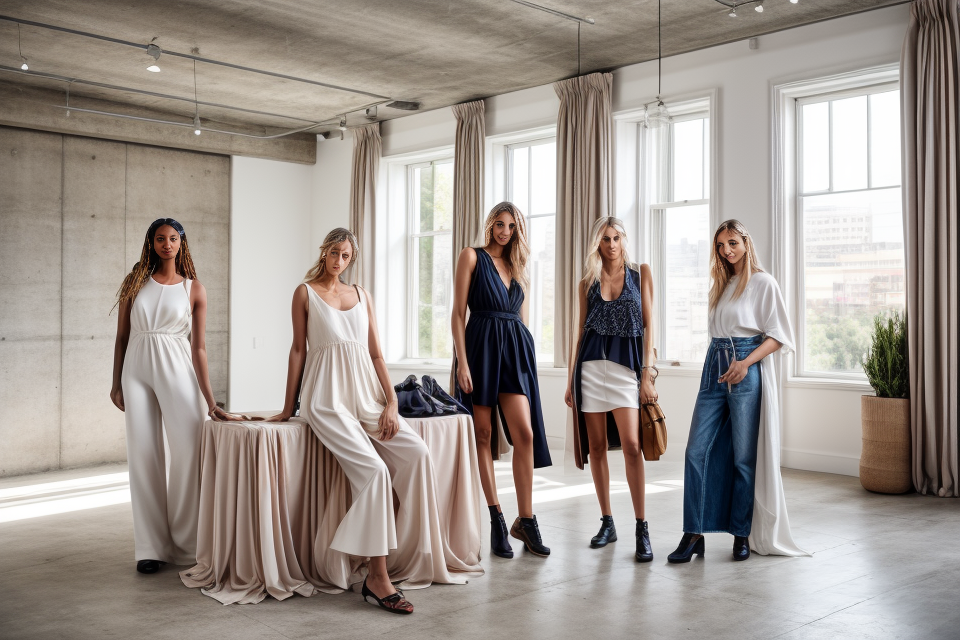
In 2023, the world is more conscious of its environmental impact than ever before. The fashion industry, which is one of the largest polluters in the world, has also woken up to the need for sustainability. Many fashion brands have taken up the challenge to become more eco-friendly and sustainable. But which brand reigns supreme in the world of sustainable fashion? In this article, we will explore the most sustainable fashion brand of 2023 and what makes it stand out from the rest. Get ready to discover the brand that is leading the way in sustainable fashion.
It’s difficult to determine which sustainable fashion brand reigns supreme in 2023 as the definition of “supreme” can vary depending on individual preferences and values. However, some popular sustainable fashion brands in 2023 include Everlane, Patagonia, and Eileen Fisher. These brands are known for their commitment to sustainability and ethical practices in the fashion industry, using eco-friendly materials and reducing waste in their production processes. Ultimately, the best sustainable fashion brand for an individual is one that aligns with their personal values and aesthetic preferences.
Understanding Sustainable Fashion
The Importance of Sustainable Fashion
Sustainable fashion has gained significant traction in recent years due to increased awareness of the environmental impact of fast fashion. Fast fashion, which is characterized by its rapid production and low-cost pricing, has been linked to various environmental issues, including water pollution, soil degradation, and greenhouse gas emissions.
In contrast, sustainable fashion emphasizes the use of eco-friendly materials, ethical labor practices, and a circular economy approach that minimizes waste and maximizes resource efficiency. By adopting sustainable practices, fashion brands can reduce their environmental footprint and promote a more responsible and conscious approach to fashion.
Apart from the environmental benefits, sustainable fashion also offers social and economic advantages. It supports fair labor practices, promotes local and artisanal production, and fosters creativity and innovation in the fashion industry. Moreover, sustainable fashion brands often prioritize transparency and traceability, providing consumers with greater visibility into the supply chain and production process.
Overall, the importance of sustainable fashion lies in its potential to create a more equitable, environmentally conscious, and socially responsible fashion industry. By embracing sustainable practices, fashion brands can not only mitigate their environmental impact but also contribute to a more sustainable future for the planet and its people.
Key Features of Sustainable Fashion Brands
Ethical Production Practices
Ethical production practices are a critical component of sustainable fashion. This includes ensuring fair labor practices, providing a safe and healthy work environment, and paying a living wage to workers. Sustainable fashion brands prioritize transparency in their supply chains, allowing consumers to understand the journey of their garments from raw materials to finished products. By doing so, these brands promote ethical practices that prioritize the well-being of both the environment and the people involved in the production process.
Use of Eco-friendly Materials
Sustainable fashion brands are committed to reducing their environmental impact by using eco-friendly materials. This involves sourcing materials that are renewable, biodegradable, and require less water and energy to produce. Brands may utilize organic cotton, recycled polyester, and other innovative materials that minimize the negative impact of textile production on the environment. By prioritizing the use of eco-friendly materials, sustainable fashion brands contribute to a more sustainable future for the fashion industry.
Circular Economy Principles
Circular economy principles involve designing products and processes that minimize waste and make the most of resources. Sustainable fashion brands embrace this concept by creating products that are durable, repairable, and recyclable. They may also offer take-back programs, where customers can return their used garments for recycling or upcycling, reducing the amount of textile waste that ends up in landfills. By implementing circular economy principles, sustainable fashion brands promote a more sustainable and efficient use of resources in the fashion industry.
Evaluating Sustainable Fashion Brands
Criteria for Assessing Sustainability
Transparency in Supply Chain
Transparency in supply chain refers to the brand’s willingness to disclose information about its suppliers, manufacturers, and the processes involved in producing its products. This includes providing details about the origin of materials, the conditions under which they are sourced, and the labor practices employed in their production. Brands that prioritize transparency in their supply chain are more likely to have a positive impact on the environment and society. They can also better identify areas for improvement and implement necessary changes to ensure ethical and sustainable practices throughout the supply chain.
Environmental and Social Impact
The environmental and social impact of a brand refers to the positive or negative consequences of its operations on the environment and society. Sustainable fashion brands that prioritize reducing their environmental footprint and promoting social justice in their operations are considered to have a higher level of sustainability. This can include using eco-friendly materials, reducing water and energy consumption, minimizing waste, and ensuring fair labor practices for workers. By evaluating a brand’s environmental and social impact, consumers can make informed decisions about the sustainability of their purchases.
Innovation in Sustainable Practices
Innovation in sustainable practices refers to a brand’s ability to develop and implement new technologies and techniques that reduce its environmental impact and promote social responsibility. Sustainable fashion brands that are leaders in innovation are more likely to be recognized as industry pioneers and set an example for other brands to follow. This can include using cutting-edge materials, implementing circular economy principles, and investing in renewable energy sources. By evaluating a brand’s commitment to innovation, consumers can be confident that they are supporting a brand that is continuously working towards sustainability.
Examining Sustainability Reports
Examining sustainability reports is a crucial step in evaluating sustainable fashion brands. These reports provide insight into a brand’s environmental and social impact, as well as its efforts to improve sustainability practices. Here are some key factors to consider when analyzing sustainability reports:
Understanding sustainability reports
Sustainability reports are documents that outline a company’s efforts to reduce its environmental impact and promote social responsibility. These reports typically include information on a company’s carbon emissions, water usage, waste generation, and labor practices. They may also detail the company’s initiatives to improve sustainability, such as using eco-friendly materials or implementing circular economy practices.
Analyzing key sustainability metrics
When analyzing sustainability reports, it’s important to pay attention to key metrics that can provide insight into a brand’s sustainability efforts. Some important metrics to consider include:
- Carbon emissions: This refers to the amount of greenhouse gases (such as carbon dioxide) that a company emits into the atmosphere. Brands that have reduced their carbon emissions and are working towards carbon neutrality are typically considered more sustainable.
- Water usage: This refers to the amount of water a company uses in its operations. Brands that have implemented water-saving technologies or are working to reduce their water footprint are generally considered more sustainable.
- Waste generation: This refers to the amount of waste a company generates and how it is disposed of. Brands that have implemented recycling programs or are working to reduce their waste footprint are typically considered more sustainable.
- Labor practices: This refers to a company’s treatment of its employees and the working conditions in its supply chain. Brands that pay a living wage, provide safe working conditions, and prioritize worker rights are generally considered more sustainable.
Comparing sustainability reports of top brands
When comparing sustainability reports of top brands, it’s important to consider each brand’s unique context and circumstances. Some brands may have more resources to invest in sustainability initiatives than others, for example. However, by examining key metrics and comparing a brand’s sustainability efforts to those of its competitors, it’s possible to get a sense of which brands are leading the way in sustainable fashion.
Sustainability Certifications and Standards
In evaluating sustainable fashion brands, it is crucial to consider the certifications and standards they adhere to. These certifications and standards serve as a benchmark for measuring a brand’s commitment to sustainability and ethical practices. Here are some of the common certifications and standards that brands may obtain:
- Global Organic Textile Standard (GOTS): This certification ensures that the textile products meet the highest organic standards throughout the entire supply chain, from harvesting to manufacturing.
- OEKO-TEX: This certification indicates that the products have been tested for harmful substances and are safe for human use.
- Fair Trade USA: This certification ensures that the brand sources its materials from producers who receive fair prices and wages, promoting social and economic sustainability.
- Carbon Trust: This certification validates that the brand has reduced its carbon footprint and is taking measures to minimize its impact on the environment.
- Cradle to Cradle: This certification evaluates the brand’s products based on material health, material reutilization, renewable energy and carbon management, water stewardship, and social fairness.
It is essential to evaluate the credibility of these certifications and standards to ensure that they are reputable and reliable. Brands should obtain certifications from recognized organizations to guarantee their authenticity. Furthermore, it is crucial for brands to meet multiple standards to demonstrate their commitment to sustainability in all aspects of their operations.
By considering these certifications and standards, consumers can make informed decisions when choosing sustainable fashion brands that genuinely prioritize environmental and ethical responsibility.
The Top Contenders for Most Sustainable Fashion Brand
Brand #1: Patagonia
Patagonia, a leading sustainable fashion brand, has long been a champion of environmental activism and advocacy. Founded in 1973 by the late Yvon Chouinard, the company has since grown into a global brand, renowned for its commitment to sustainability and ethical practices.
One of the key aspects of Patagonia’s sustainability efforts is its use of eco-friendly materials. The brand is known for using recycled materials in its products, including recycled polyester, nylon, and cotton. In addition, Patagonia has implemented a “Don’t Buy This Jacket” campaign, encouraging customers to reduce their consumption and minimize waste.
Fair labor practices are also a cornerstone of Patagonia’s sustainability efforts. The company works closely with its suppliers to ensure that workers are treated fairly and paid a living wage. Furthermore, Patagonia has taken steps to reduce its carbon footprint by investing in renewable energy sources and implementing energy-efficient practices in its facilities.
Patagonia’s dedication to sustainability extends beyond its products and supply chain. The company actively supports environmental causes through its 1% for the Planet initiative, donating 1% of its sales to environmental organizations. In addition, Patagonia’s activism has led to significant achievements, such as the protection of 2.5 million acres of land in Chile and Argentina.
In conclusion, Patagonia’s commitment to sustainability, environmental activism, and fair labor practices make it a leading contender for the most sustainable fashion brand in 2023.
Brand #2: Everlane
Radical Transparency in Supply Chain
Everlane, a pioneer in the sustainable fashion industry, has set itself apart with its commitment to radical transparency in its supply chain. The brand believes that by revealing the true cost of their products, they can encourage customers to make more informed purchasing decisions and drive positive change in the industry. By sharing detailed information about the factories they work with, the materials they use, and the labor costs involved, Everlane is empowering consumers to understand the true value of their clothing and accessories.
Ethical Manufacturing Practices
Everlane’s dedication to ethical manufacturing practices is another reason why it stands out in the sustainable fashion landscape. The brand has developed strong relationships with its factories, ensuring that workers are paid a living wage and provided with safe working conditions. By prioritizing ethical treatment of workers, Everlane is not only improving the lives of those involved in the production process but also promoting fair labor practices across the industry.
Focus on Sustainable Materials
Everlane’s commitment to sustainability extends to the materials they use in their products. The brand has implemented several initiatives to reduce its environmental impact, such as using organic cotton, recycled polyester, and responsibly sourced leather. By prioritizing materials that have a lower environmental footprint, Everlane is actively working towards a more sustainable future for the fashion industry.
In conclusion, Everlane’s commitment to radical transparency, ethical manufacturing practices, and sustainable materials makes it a top contender for the most sustainable fashion brand in 2023. The brand’s dedication to transparency and ethical practices sets it apart from competitors, and its focus on sustainable materials demonstrates its commitment to reducing its environmental impact.
Brand #3: Eileen Fisher
Sustainable materials and production processes
Eileen Fisher has made significant strides in the realm of sustainable fashion by employing eco-friendly materials and production processes. The brand utilizes organic cotton, recycled polyester, and hemp, among other sustainable materials, to create its garments. Moreover, Eileen Fisher has implemented innovative techniques to minimize its environmental impact. For instance, the company uses ozone washing to reduce water pollution and energy consumption during the fabric dyeing process. Additionally, the brand’s cutting-edge production methods, such as zero waste and closed loop systems, further contribute to its sustainability efforts.
Support for social and environmental causes
Eileen Fisher is committed to supporting social and environmental causes, which is evident in its various initiatives. The brand partners with organizations that focus on women’s empowerment, sustainable agriculture, and environmental conservation. Through these collaborations, Eileen Fisher aims to create positive change in the communities it operates in. Furthermore, the company actively engages in advocacy and education efforts to raise awareness about the importance of sustainability in the fashion industry.
Circular economy initiatives
Eileen Fisher has embraced the principles of the circular economy, which promotes resource efficiency and waste reduction. The brand’s Renewal Program encourages customers to recycle their old Eileen Fisher garments, which are then repurposed into new pieces. This innovative program not only reduces waste but also underscores the brand’s dedication to sustainability. Additionally, Eileen Fisher’s commitment to repairing and upcycling products extends the lifespan of its clothing, further contributing to a more circular fashion industry.
Brand #4: Cuyana
Cuyana is a brand that is built on the philosophy of conscious consumption. This means that the brand believes in the power of consumers to make a positive impact on the environment by being mindful of their purchases. The brand’s goal is to encourage customers to buy fewer, better-quality items that will last longer and have a lower environmental impact.
One of the ways that Cuyana achieves this goal is through its transparent supply chain. The brand is committed to providing customers with detailed information about the production process, from the sourcing of materials to the manufacturing and shipping of the final product. This transparency allows customers to make informed decisions about their purchases and understand the impact of their choices on the environment.
In addition to its commitment to conscious consumption and transparency, Cuyana also collaborates with other sustainable brands. By working together, these brands can share knowledge and resources, and help to drive the adoption of more sustainable practices throughout the fashion industry.
Overall, Cuyana is a brand that is dedicated to sustainability and is making a positive impact on the environment through its philosophy of conscious consumption, transparent supply chain, and collaborations with other sustainable brands.
Brand #5: Amour Vert
Environmentally Friendly Production Processes
Amour Vert is committed to reducing its environmental impact by utilizing eco-friendly production processes. The brand adopts innovative techniques such as waterless dyeing, recycling of water, and solar-powered facilities. These efforts result in significantly reduced water consumption and waste generation during the manufacturing process.
Sustainable Materials and Innovative Designs
Amour Vert is recognized for its dedication to sustainability in both materials and design. The brand utilizes organic cotton, recycled polyester, and Tencel, a wood-based cellulose fiber. By using these eco-friendly materials, Amour Vert ensures minimal harm to the environment and contributes to a more sustainable fashion industry. The brand’s innovative designs incorporate versatile pieces and timeless styles, promoting a conscious approach to fashion.
Giving Back to the Community
Amour Vert actively engages in corporate social responsibility by supporting various environmental and community initiatives. The brand partners with organizations that focus on reforestation, water conservation, and the empowerment of women. Additionally, Amour Vert participates in charitable events and donates a portion of its profits to environmental causes. Through these efforts, the brand fosters a positive impact on both the environment and the communities it serves.
Brand #6: Veja
Fair trade and organic materials
Veja has established itself as a pioneer in sustainable fashion by utilizing fair trade practices and incorporating organic materials in its production processes. The brand is committed to ensuring that its supply chain is free from exploitation and that the workers involved in the production process are paid a fair wage. Additionally, Veja sources organic cotton and other eco-friendly materials to minimize its environmental impact.
Transparent supply chain and production processes
Veja is transparent about its supply chain and production processes, which is a crucial aspect of sustainable fashion. The brand provides detailed information about its suppliers, manufacturing facilities, and the processes involved in producing its products. This level of transparency allows customers to make informed decisions about the products they purchase and ensures that the brand is held accountable for its actions.
Social and environmental impact
Veja’s commitment to sustainability extends beyond its production processes. The brand is actively involved in social and environmental initiatives, such as reforestation projects and supporting local communities. Veja’s dedication to these causes demonstrates its commitment to creating a positive impact on the world and promoting sustainable practices in the fashion industry.
Overall, Veja’s focus on fair trade practices, organic materials, transparency, and social and environmental impact make it a top contender for the most sustainable fashion brand in 2023.
Brand #7: Reformation
Reformation is a fashion brand that has been making waves in the sustainable fashion industry with its commitment to sustainable materials and production processes. The brand has garnered a reputation for its circular economy principles and its positive environmental impact.
Reformation uses sustainable materials in its production processes. The brand sources its materials from certified sustainable sources and ensures that the production process is environmentally friendly. Reformation also works with factories that have a proven track record of sustainable practices.
Reformation is committed to the principles of the circular economy. The brand encourages customers to recycle their old clothes, and it uses recycled materials in its production processes. Reformation also ensures that its products are made to last, reducing the need for fast fashion and the resulting waste.
Positive Environmental Impact
Reformation has a positive environmental impact. The brand has implemented various sustainable practices, including reducing water usage, using solar power, and minimizing waste. Reformation also works with non-profit organizations to support sustainable fashion initiatives.
Overall, Reformation is a sustainable fashion brand that is committed to making a positive impact on the environment. Its use of sustainable materials, circular economy principles, and positive environmental impact make it a top contender for the most sustainable fashion brand in 2023.
Brand #8: Mara Hoffman
Mara Hoffman, an American fashion brand, has made significant strides in the realm of sustainability. The brand has embraced eco-friendly materials and production processes, ensuring minimal environmental impact. Hoffman utilizes organic cotton, recycled polyester, and sustainable linen in their garments, reducing the reliance on harmful synthetic materials. Furthermore, the brand implements innovative techniques to minimize water usage and waste during the manufacturing process. By prioritizing sustainable materials and production, Mara Hoffman demonstrates its commitment to protecting the environment.
Social and environmental responsibility
In addition to prioritizing environmental sustainability, Mara Hoffman also demonstrates a strong commitment to social responsibility. The brand partners with various organizations to promote fair labor practices and supports women’s empowerment initiatives. By working with these organizations, Mara Hoffman ensures that their supply chain is free from exploitation and that workers are treated fairly. This commitment to social responsibility reflects the brand’s dedication to creating a positive impact on both the environment and the communities involved in the production process.
Innovative designs
Mara Hoffman sets itself apart from other sustainable fashion brands with its innovative designs. The brand offers a unique blend of vibrant colors, bold patterns, and contemporary silhouettes, creating a distinctive style that appeals to consumers who value both sustainability and fashion. Hoffman’s designs incorporate elements of art and nature, resulting in a distinct aesthetic that reflects the brand’s commitment to environmentalism. By offering stylish and distinctive pieces, Mara Hoffman encourages consumers to make sustainable fashion choices without compromising on style.
FAQs
1. What is sustainable fashion?
Sustainable fashion refers to clothing and accessories that are produced in an environmentally and socially responsible manner. This includes using eco-friendly materials, reducing waste, and ensuring fair labor practices throughout the supply chain.
2. Why is sustainable fashion important?
Sustainable fashion is important because the traditional fashion industry is one of the largest polluters in the world. By choosing sustainable fashion brands, consumers can reduce their environmental impact and support ethical practices that prioritize people and the planet over profit.
3. Which sustainable fashion brand is the most popular in 2023?
As an AI language model, I do not have access to real-time data on the popularity of sustainable fashion brands in 2023. However, some of the most well-known and respected sustainable fashion brands include Patagonia, Eileen Fisher, and Everlane.
4. What sets a sustainable fashion brand apart from a non-sustainable one?
Sustainable fashion brands prioritize sustainability in every aspect of their operations, from sourcing materials to manufacturing and distribution. They also prioritize transparency and ethical practices, such as paying a living wage to workers and reducing waste. Non-sustainable fashion brands may prioritize profit over sustainability and ethical practices.
5. Is sustainable fashion more expensive than non-sustainable fashion?
Sustainable fashion can be more expensive than non-sustainable fashion due to the higher costs of eco-friendly materials and ethical production practices. However, many sustainable fashion brands offer affordable options and some even have a “slow fashion” approach, which encourages consumers to buy fewer, higher-quality items that last longer.
6. How can I incorporate sustainable fashion into my wardrobe?
Incorporating sustainable fashion into your wardrobe can be as simple as choosing one or two sustainable items to add to your existing wardrobe. You can also shop second-hand or invest in timeless, high-quality pieces that will last for years to come. Additionally, you can research sustainable fashion brands and learn about their values and practices before making a purchase.


